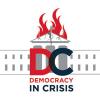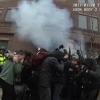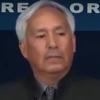Should Academics Fight Fascists or Include Them?
Democracy in Crisis

Masha Gessen.
The great Russian-American writer Masha Gessen was standing on the stage at Bard College in New York in front of a sign that read “Crises of Democracy”—the name of a conference there sponsored by the Hannah Arendt Center last month.
“I think it’s safe to say that all of us are living in a state of low-level dread always suspecting that we are missing something of enormous impact while chasing something else of enormous impact,” she said, standing in front of the podium with short dark hair, thick glasses and a stylish sports jacket. She resembled the famous portrait of a young Arendt.
Gessen—who has just released The Future Is History: How Totalitarianism Reclaimed Russia—compared her experience in Trump’s America over the last year to that of living under Putin when “the only skill I had really honed for more than 10 years was the skill of protecting the views I already held.”
The book follows seven different characters from the 1980s through the present, weaving narratives of their lives together into a vast tapestry that, among other things, presents the brief rise and swift destruction of gay rights in Russia—a development which caused Gessen, who immigrated to the U.S. as a teenager and returned to Russia as a reporter, to go into exile once again.
Among the book’s main characters is Alexander Dugin, the far-right ideologue behind Putin’s nationalism—and an influence on Breitbart News chairman Steve Bannon and white supremacist Richard Spencer, who is married to Dugin’s primary English translator. Gessen shows, that in 1984, Dugin was in love with Evgenia Debryanskaya, who later became an activist for LGBT rights, and then follows them, tragically, to the present.
Another speaker at the conference was Marc Jongen, the Dugin of the AfD, the far-right Alternative for Germany party, which got 13 percent of the vote in a recent election, giving Jongen a seat in parliament. Last week, a group of 50 professors and academics wrote a letter to the Chronicle of Higher Education condemning the Hannah Arendt Center for lending its legitimacy—and the legacy of Arendt—to the extreme and violent positions of Jongen and the AfD.
“The AfD subscribes to a nationalist far-right agenda and is closely allied with the violent street movement ‘Pegida’ ("Patriotic Europeans Against the Islamization of the West" ) that attacks refugees, immigrants, and Muslims,” the letter reads. “Jongen is devoted to providing intellectual legitimacy to the AfD’s extreme rhetoric and actions. His philosophical jargon seeks to justify the incitement and violence carried out by Pegida, including the physical blockade of refugee buses, as the expression of a laudable ‘thymos,’ or rage, that has been suppressed by liberalism and multiculturalism.”
But to hear Jongen tell it during his speech at Bard, he is oppressed and his free speech is limited in Europe where people show up to protest his talks. “Since I joined the AfD… I made the experience that conferences where I should appear were disturbed, there was a huge protest going on when I should give a talk in Switzerland,” he said, adding, as do his American counterparts, that his opponents were really protesting free speech. He blamed it on the “specter of Hitler” haunting Germany.
The controversy over his appearance at a university may cast Jongen under the specter of Richard Spencer or Milo Yiannopoulos in the American mind—but instead of states of emergency and antifa and alt-right battling in the streets, we now have the polite and archaic battle of academics that is almost reminiscent of the old Partisan Review. There were no chants and signs and attempts to shut him down. And while the questions from the audience expressed a deep sense of disturbance, it was all so quiet that you could sleep through it.
Roger Berkowitz, the founder and director of the Arendt Center, has since argued that it was essential to “include at least one person who represents the idea of an illiberal democracy,” since “[m]ajorities of people in Hungary, Russia, Turkey, and Austria and that large pluralities of people in France, Germany, and the United States [amongst other countries] are embracing ideas of democratic nationalism and democratic authoritarianism.”
It is as if, at a conference 50 years ago, an organizer had invited a Nazi to add balance to Arendt’s critique of totalitarianism.
Berkowitz, however, sees a parallel with Arendt’s own struggle against fascism while also making a career out of discussing it. “Her account of Adolf Eichmann sought to understand who Eichmann was and what it was that allowed him to actively participate in the killing of millions of Jews. For many of her readers, this effort to understand Eichmann was a betrayal. They thought he should be simply and categorically condemned as a monster.”
But Berkowitz’s Arendt analogy, which employs the same “both sides-ism” that Trump used after Charlottesville, is way off. Inviting a speaker and giving him a platform is not a way of analyzing his ideas. In his defense, Berkowitz cited Arendt wondering “how to write historically about something — totalitarianism — which I did not want to conserve, but on the contrary, felt engaged to destroy.”
Gessen’s book, not Jongen’s speech, is the answer. Her account of Dugin—or her previous portrait of Putin, The Man Without a Face—is a far more effective, and Arendtian, way to deal with noxious ideas and the people who espouse them. In The Future Is History, Gessen, who has since written about the slow-motion academic conference version of a protest in the New Yorker, places Dugin in his time, in the world of others, and pits his policies against those harmed by them. That is the true meaning of Arendt’s “plurality of voices” that make up politics, not a false sense of giving all voices an equal weight.
Keywords
More by Baynard Woods
-

With Much Love and Grim Solidarity, Democracy in Crisis Says Goodbye
Democracy in Crisis
-

Trump Uses the Legal System for His Own Ends
Democracy in Crisis
-

A Mexican Reporter's Death Threats Are the Future of Journalism in America
Democracy in Crisis









comments